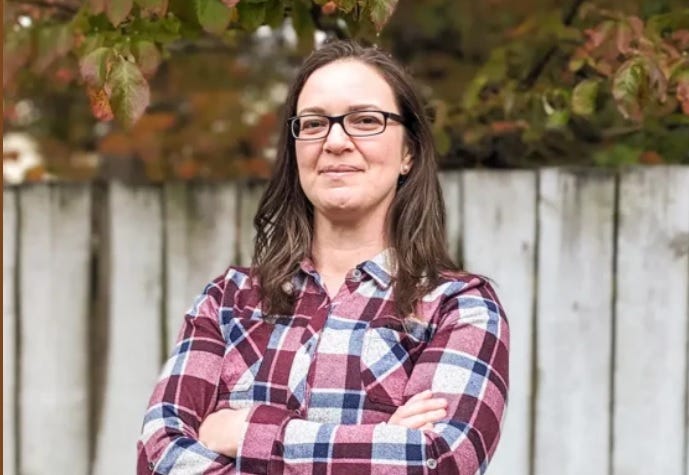Wonkette Pal Sarah Taber Running For NC Ag Commissioner, So Move There And Vote For Her!
Honestly, she got us excited about tomato sauce.
Wonkette friend and contributor (not enough; she’s very busy!) Dr. Sarah Taber, a crop scientist who’s been working in agriculture for 26 years, is running to become North Carolina’s agriculture commissioner, and we are all in. If you missed them the first time around, check out Taber’s hilarious takedown of a New York Times trend piece about stylish rich folks trying to make tenant farming chic, or her excellent explanation of why, no, rural poverty doesn’t drive people to try to kidnap Michigan governors because you need money to be a white power domestic terrorist.
Now, while affiliation with Yr Wonkette is certainly plenty of qualification for office its own right, Taber also has a lot of other things going for her too. Before interviewing her, we warned her not to say anything communisty, then asked what she would do if she were Lenin. If you can believe it, she just laughed!
As she explained in a January op-ed in The Nation, the ag commissioner in North Carolina has two basic jobs:
First, we’re supposed to help our state’s farm economy grow. Second, we handle the health and safety needs related to agriculture. Local meat packing plants? We inspect those. Pesticide use, manure, and other farm materials that can cause trouble when not used properly? We enforce those standards. Bird flu outbreak in our state? We work with farmers to keep it contained.
On that making the farm economy grow, Taber told us in a proper interview, there’s a lot North Carolina could be doing to expand its agriculture economy that it simply is not. The incumbent commissioner, Steve Troxler, is a tobacco farmer who seems content for the state’s farm economy to remain fairly static, relying on tobacco, hog farms, and cattle and chicken — even in a state that, unlike Iowa for instance, can’t grow enough soy and corn to feed its animal production, so buying feed from other states cuts into producers’ profits.
What’s more, since two-thirds of farm sales in the state consists of hogs and chickens, farmers are mostly competing to sell to a fairly limited number of processors, which drives down prices and leads to pretty low revenue per acre. Taber thinks it would be a lot better for North Carolina agriculture to diversify so farmers can actually make money on what they produce. Part of the job is simply letting farmers know the options are there, and getting past resistance to change. “Sometimes when you point out that we can do this better,” she said, “people think you mean they’re doing it wrong.”
Showing proof that diversification works helps get past that, and Taber knows first-hand about how diversifying crops can boost farmers’ income. She’s worked on farms all over, and in her work as a business coach for farms, she’s helped family farms grow vegetables in greenhouses, which, as she says in The Nation, can be
a great livelihood if you get it right—but if you get one detail wrong, you’ll lose your shirt. I’m proud to say every single one of my farm clients is still in business. Altogether, they’re now worth $4 billion. I’ll go toe-to-toe with anyone in North Carolina on that track record.
Taber goes into detail on her plans to revitalize North Carolina farming on her campaign site, which — in a really pleasant change from most boilerplate campaign sites — is actually an interesting read. She’s a big fan of fruit and vegetables — not out of some sneaky vegan agenda, but because they can bring North Carolina farmers “10-100x more revenue than North Carolina’s current standbys like corn, soy, and tobacco.”
What’s more, North Carolina is in a great position to at least partly replace California as a source of fruit and vegetables for the Northeast market, since California agribusinesses face a future of dwindling water supplies, even with the temporary drought relief it’s received from the last two winters’ storms. There are billions of dollars to be made by diversifying North Carolina’s crops, but as Taber explained in our interview, the problem is that many farmers don’t know about all the options for diversification, and the state’s current agriculture leadership simply isn’t doing what it could to build up the infrastructure to make diversification possible. She pointed out that in the Netherlands, New Zealand, and even in California, “they aren’t growing just five things, they’re growing 50. So how have we had one guy in the [commissioner’s] office for 20 years and this comes as news?”
Unfortunately, Steve Troxler isn’t a change-y kind of guy. He’s big on a familiar (and untrue) aphorism in tobacco country: “The only thing more lucrative than an acre of tobacco is another acre of tobacco.” That may be true of trying to compete by raising corn and soy, but Taber notes that other crops like strawberries or high quality tomatoes can fetch up to $40,000 an acre, compared to $4,000 per acre for tobacco. Troxler’s big claim to fame had been his successful agreement to create markets for North Carolina tobacco in China, which is becoming the world’s top cigarette maker — but Donald Trump’s trade war undercut that plan.
Even tomatoes grown for tomato sauce can bring in more per acre than tobacco, but that’s where infrastructure becomes a problem: North Carolina lacks the processing plants needed for some crops to turn a profit. Shipping sauce tomatoes to where the sauce processors are isn’t an option; beyond the cost, they’d be half moldy by the time they got to the plants in California. Similarly, the climate is ideal for hazelnut trees, but the closest plant that makes nut butter is in the Midwest.
Taber’s no Reaganista, and she does know how market forces work: The wider the variety of crops farms are growing, the more different clients they’ll be selling to, preventing downward price pressure and protecting smaller operations from being swallowed up by the bigger monoculture operation down the road. But farmers need good information, and they need markets for any new crops they’re shifting into.
North Carolina has multiple lines of funding that could be used to create grant programs for diversified processing infrastructure — but instead, the funds have instead gone to assist corn, soy, and livestock producers when prices have been flat. A better use of the grant programs, Taber says, would be to invest in expanding the range of ag products the state produces, to prevent statewide farm losses when one commodity has slack times. Yes, help people in tough times — but diversify agriculture so there are fewer tough times.
Beyond state funds, Taber pointed out, North Carolina is simply leaving on the table a lot of federal funds and private investment opportunities that farmers could take advantage of. That’s because unlike in most states, the Ag Department doesn’t fund staff whose sole job is to help farmers connect with those funding opportunities. For instance, the Biden administration made some $200 million in grants available to improve the nation’s agricultural infrastructure, but only one big ag operation* in the state actually received a chunk of that funding, to the tune of $250,000. North Carolina simply “isn’t doing a normal thing that other states do,” she said, and that’s hurting the state’s farm economy.
*Correction/update: Sarah Taber DM’d me with a small correction: it wasn’t a big ag operation, it was actually “a nice small/midsize mushroom operation in Asheville. Not big ag, they just happened to be, like, professional enough to be able to write their own grant! We just should have had at least 5-10 more operations that could do the same if there were folks helping w grantwriting.” Wonkette regrets the error and agrees!
Also, darn right Taber supports legalizing weed, because a 15 percent excise tax on legal marijuana could bring in $810 million annually, a huge source of revenue. North Carolina doesn’t have a ballot initiative process, but a pro-weed-and-hemp ag commissioner would have considerable ability to bring together coalitions to move legalization in the state Lege.
Taber told us that when she talks to farmers about all this stuff, even (or especially!) in great technical detail, they get it, because they see that the way North Carolina has been doing agriculture is no longer a way to make a good living. But rural farm voters only make up about one percent of North Carolina voters. Steve Troxler has managed to hang on in office 20 years largely thanks to the “R” after his name, and because he looks to suburban voters like what a farm guy ought to be — even after his administration has experience some screaming scandals like “the largest crop insurance fraud ring in US history,” and aides’ lavish spending on dinners and hotels.
But Taber also points out that in deep red Florida, Democrat Nikki Fried won election as agriculture commissioner in 2018 because voters want leaders who understand what’s good for the economy and good for the people who make it work. As she put it in The Nation,
I know how to help farmers be successful working for themselves—not corporations. I know firsthand the difference that adequate, fair lending makes to every farmer. I know treating workers right makes businesses work better, because people have a chance to put down roots and build skills in their jobs. Bottom line: I know how to do business.
Well hell yes. North Carolina farmers — and people who eat food! — deserve an agriculture commissioner who won’t just bring more of the same, because that has meant stagnation. Also, she assured us that, vegetable-oriented though her policies may be, she is nonetheless an omnivore and an enthusiast of the North Carolina tradition of eating “Shower Ribs,” where you take a shower and have a friend hand you leftover ribs that you can consume without fear of dripping anything on your nice clothes. She suspects the humidity may enhance the flavor.
Hey, if you have a few Ameros to spare, how about helping her make a purple state a lot better for everyone?
STORIES BY SARAH TABER, AQUI!

Weep, Weep (Don't Weep) For The Poor (Not Poor) White Supremacists (Definitely White Supremacists)!
[Nation / Taber for NC]
Yr Wonkette is funded entirely by reader donations. If you can, please subscribe, or if you’d like to help our garden grow with a one-time donation, here’s the sustainable way to do that:





OMG, this is an amazing and NICE TIMES! story. I already love Taber. Her expertise sounds more than qualifying, and her policies sound wonderful. Let's get her in!
And while there, perhaps she can turn Mark Robinson into fertilizer? (The Republican who is currently Lt Gov, not the Dem who is running for Lt Gov.) Asking for an entire population.
Farmers. Ugh. Good for her to be willing to devote her life to dealing with farmers. We need them, but if there's a "cut off your nose to spite your face" demographic, them's them.
One of my younger brothers got a degree is some sort of ag-related field.
("field," get it? Heh-heh)
He did a research project on no-till farming. He got a bunch of farmers in Wisconsin to commit to planting cover crops, which themselves had value and use as commodities, over-winter; and to not plow their fields at the end of harvest. The idea was that the cover crops would eliminate soil runoff over the winter, were the kinds of plants that would actually re-enrich the soil, and it would save them a lot of fuel and chemical costs overall.
Already in the first year, the project was showing results.
The next year, most of the farmers dropped out of the project and went back to plowing in the fall, losing topsoil over the winter, and having to buy more pesticides, herbicides, and fertilizer to use their depleted soil. And a lot more diesel fuel.
Why? Because the ag equipment salesmen, chemical salesmen, and their neighbors, teased them. They left tens of thousands of dollars on the table, instead of in their own pockets; damaged their fields; decreased their income and increased their costs; because they got mocked.
Good luck getting idiots like that to do something sensible.